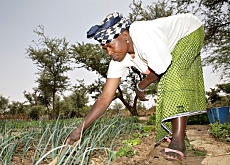Aid organisation looks back on 60 years

Swissaid, a sprightly 60 on Friday, says it is proud of the political awareness it has raised, and thinks criticism of government policies bodes well for the future.
But the non-governmental organisation (NGO) says serious challenges remain – not least the current global financial meltdown.
“The financial crisis will push the food crisis out of people’s minds, although hunger claims victims in the southern hemisphere on a daily basis,” said Swissaid director Caroline Morel on Wednesday.
She added that the billions being spent on saving the banks would make helping the 925 million people in the world who suffer from acute hunger “considerably more difficult”.
Morel said that despite Swissaid’s work for 60 years, rich countries such as Switzerland lacked the political will to address the problem of hunger effectively and sustainably.
Foreign Minister Micheline Calmy-Rey was attending Friday’s birthday celebrations in Bern’s town hall.
Swissaid has repeatedly called on the government to increase its spending on development projects abroad. But to ensure that funding is well spent, it believes the authorities have to put pressure on corrupt governments that are sucking the lifeblood out of their populations.
In addition, it says highly subsidised food from Europe and North America is imported, flooding local markets and discouraging farmers from production. With little or no local competition, prices go up and products become unaffordable.
Swissaid says the solution is to support local projects encouraging the population to take up farming again. In the villages where this support has been available, there is now enough food on the table and money in pockets thanks to revised agricultural practices.
“Right track”
Swissaid’s origins lie in the period of “rebuilding” after the Second World War and the integration of refugees. The organisation “Swiss European aid” was founded in 1948.
Eight years later it set its sights further afield and changed its name to “Swiss foreign aid”. The first project, in India, started in 1960.
Swissaid, as the organisation has been known since 1969, currently operates in nine countries in Asia (India, Myanmar), Latin America (Ecuador, Colombia, Nicaragua) and Africa (Guinea-Bissau, Niger, Tanzania, Chad). Its overseas offices are staffed exclusively by local people.
Morel says that the organisation’s main goals of organic farming, self-determination, sustainability and the fair distribution of wages have recently become an explosive issue all around the world.
This, and Swissaid’s lobbying in favour of development aid, was reflected, she said, in the government’s recent decision to raise its development aid contribution to 0.5 per cent of gross domestic product (GDP) until 2015.
“That shows we’re on the right track,” she said. “We can be proud of our work so far, but we’re still far from our targets.”
Revolutionary
Andreas Bänziger, a former journalist and Swissaid’s information chief from 1972-1978, says Swissaid played a pioneering role in the early days of development aid.
“We not only concentrated on publicity and fundraising but also on raising awareness about problems in developing countries and the local population,” he told swissinfo.
“It was a new approach in the sense that we saw development aid not only as helping poor people but also as a political issue. Information became more important than just publicity or fundraising.”
Bänziger, who still sits on the foundation council, explains how instead of sending Swiss experts to India to teach people “how we did things in Switzerland”, Swissaid supported local initiatives.
“Even back then that was possible in India because a kind of a civil society already existed. This was not so much the case in Africa, where this civil society developed later,” he said. “This was a revolutionary approach at the time.”
Bänziger is also concerned about the potential effect of the financial crisis on development funds, but believes the strategic course taken by Swissaid, and its influence on other aid agencies, has been positive.
“I think the whole NGO sector has moved in the right direction and Swissaid was somewhat of a pioneer in that process.”
swissinfo, Thomas Stephens
Swissaid employs 84 people around the world – 29 in Bern and Lausanne.
It gives its support to 222 local projects and does not intervene with experts from developed nations.
Swissaid operates with an annual budget of around SFr15.5 million. It committed over SFr11.6 million to work in the southern hemisphere in 2007, up 23% on the previous year.
The Swiss Agency for Development and Cooperation (SDC) contributed 36% of Swissaid’s funding in 2007, i.e. SFr5.6 million. Swissaid received around SFr9.8 million, an increase of 20% on the previous year, from local authorities, cantons, foundations, Swiss Solidarity and from thousands of donors around Switzerland.

In compliance with the JTI standards
More: SWI swissinfo.ch certified by the Journalism Trust Initiative













You can find an overview of ongoing debates with our journalists here . Please join us!
If you want to start a conversation about a topic raised in this article or want to report factual errors, email us at english@swissinfo.ch.